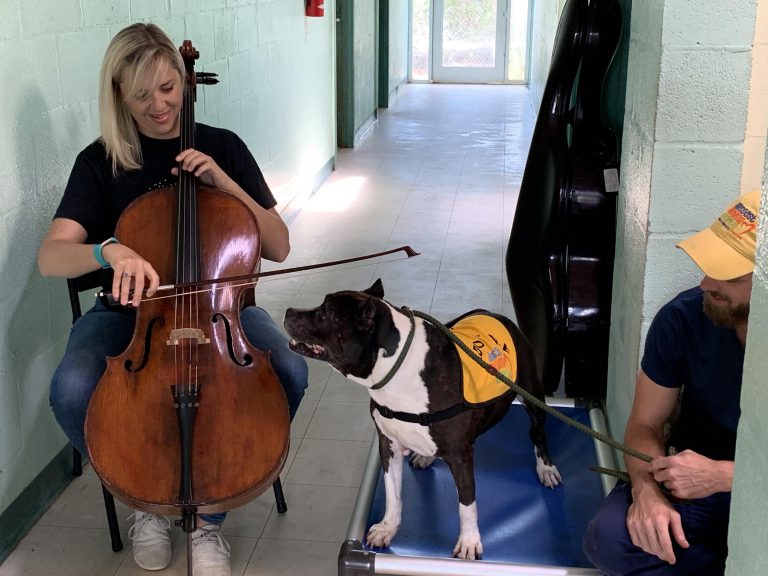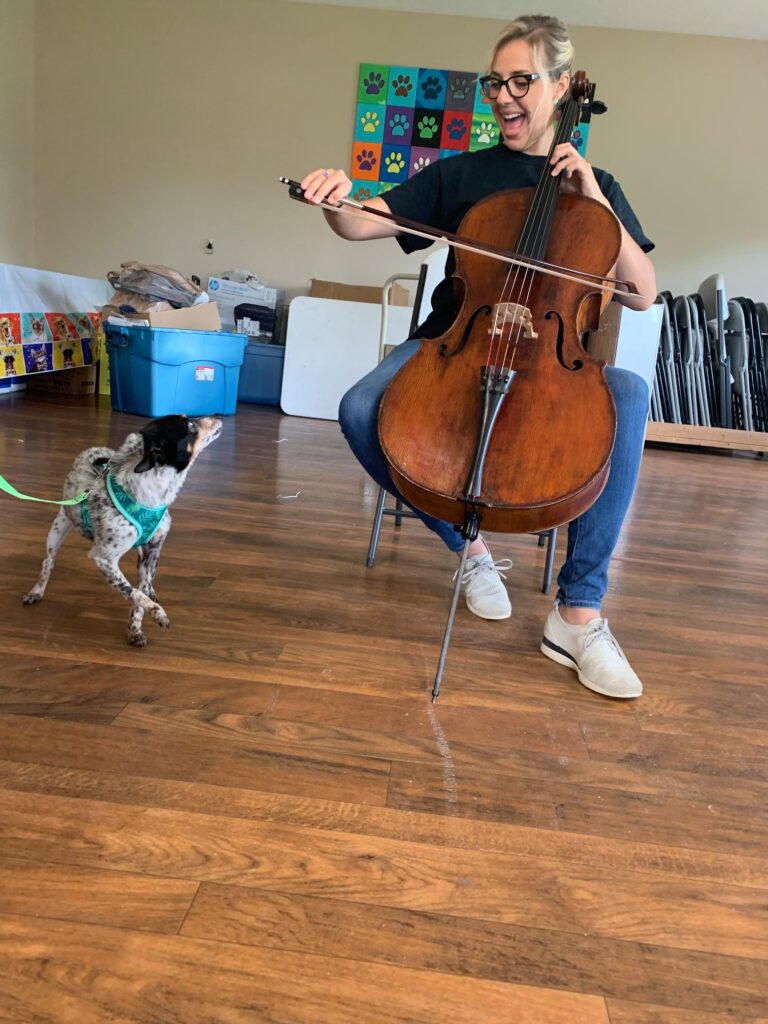“I play a lot of solo Bach for them,” cellist Natalie Helm says.
They are dogs. Before the pandemic struck, Helm, principal cellist with the Sarasota Orchestra, had spent the last four years playing classical music for dogs at animal shelters in Florida in her spare time.
She plans to play lots more doggy concerts once it is safe to do so again. For now, she plays for a very special audience of one during the day while her husband Michael is at work—their nearly 7-year-old dog D’Angelo, who curls up on the couch in her practice room and listens to every note as she plays the cello for four to six hours a day.

Music therapy
Research has shown that music is beneficial for canines. “It has a lot of the same effects on dogs that it has on humans,” Helm says. “The studies show that it lowers the heart rate, decreases stress hormones and soothes them.” One study conducted by the Scottish SPCA and the University of Glasgow in 2015 focuses exclusively on shelter dogs and confirms that listening to classical music in particular decreases their stress levels (another study suggests that dogs also like a bit of reggae).
Keeping her audience’s sensitive ears in mind, Helm performs compositions that are slow and full of low notes. “I never go too high,” she says, pointing out, “the cello is the instrument that reflects the human voice the most. So if you stay in the lower range of the instrument it’s much more like the human voice, and the vibrations aren’t so intense.”

Helm’s dog concerts are intimate. The cellist goes into a room at the shelter and plays for only two or three dogs at a time. But the sound of the music travels. “When I do start playing, it does quiet down the facility,” she says.
That said, some dogs just have to make their voices heard. “Hounds really do want to sing along, and it’s a compliment,” Helm says.
The cellist also organizes and plays free concerts for people through Upward Notes, an organization she founded to take music out of the concert hall and into the community. She and her musician friends have played venues including prisons, shelters for people who are experiencing homelessness and assisted-living facilities.
The most important audience
 At home, D’Angelo doesn’t sing along. He’s actually pretty quiet. “We did not know he knew how to bark for probably two years,” Helm says.
At home, D’Angelo doesn’t sing along. He’s actually pretty quiet. “We did not know he knew how to bark for probably two years,” Helm says.
The couple adopted the Italian greyhuahua—that’s a mix of Chihuahua and Italian greyhound—four years ago. Helm wasn’t planning to leave with a dog when she and Michael walked into a shelter in Alabama the day her childhood dog passed away. “I just wanted to go to the shelter to be around dogs,” Helm says.
But then they spotted D’Angelo. They noticed how organized and neat he kept his crate, were impressed with how smart he clearly was and asked if they could spend some time with him. “We took him out, and he went to the bathroom, and when he was done, he led us directly back to his cage. He didn’t want anything to do with us,” Helm recalls. “We were very amused by that and intrigued.” Intrigued enough to take him home that day.
Though small in stature, when he is at the dog park D’Angelo acts like “the big man on campus,” Helm says. At home, he’s more of a momma’s boy. “My favorite time of day is waking up in the mornings—he has his little face on my pillow and is curled up in my arms. We spoon each other all night,” she says.
Helm still remembers the first time she played the cello for her little buddy. “He just laid down on my feet—completely at peace,” she says.
Beyond being a lovable companion with excellent taste in music, D’Angelo is a constant source of creative inspiration for Helm. “There are moments when you’re digging for emotion, and there have definitely been times when I have pictured D’Angelo to grasp the depth of emotion for a certain piece. And, of course, my husband,” Helm adds with a laugh.
Has she ever composed a song for D’Angelo? “I haven’t, but that’s a really good idea,” she muses.
See more of D’Angelo on Helm’s Instagram @nataliehelmcello.









